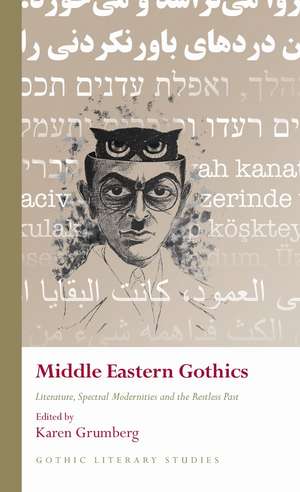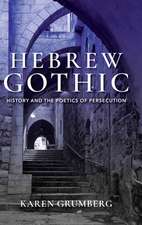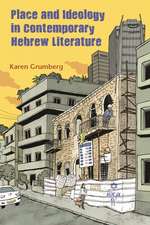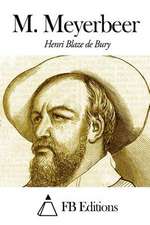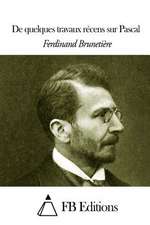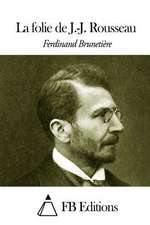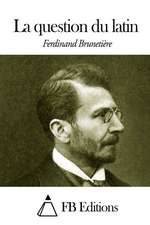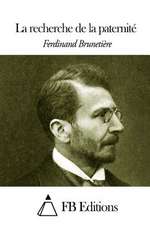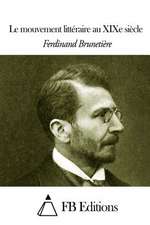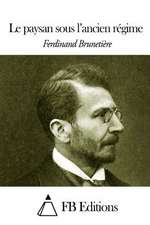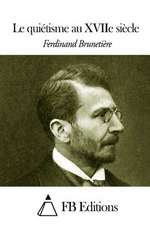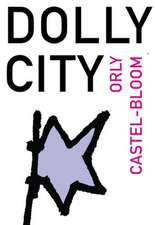Middle Eastern Gothics: Literature, Spectral Modernities and the Restless Past: Gothic Literary Studies
Editat de Karen Grumbergen Limba Engleză Hardback – 20 mai 2023
This is the first collection to cover Gothic literature from the Middle East and North Africa, surveying each of the major Middle Eastern languages—Arabic, Hebrew, Persian, and Turkish. In these languages and contexts, the Gothic helps express ongoing literary negotiations with modernity, leaving its distinctive mark on representations of globalization, postcolonialism, and nationalism. At the same time, Middle Eastern literary texts expand the boundaries of the mode on their own terms, refracting broad histories through local and indigenous forms, figures, and narratives commonly associated with the Gothic.
Din seria Gothic Literary Studies
-
 Preț: 191.86 lei
Preț: 191.86 lei - 11%
 Preț: 508.59 lei
Preț: 508.59 lei - 11%
 Preț: 508.33 lei
Preț: 508.33 lei - 11%
 Preț: 508.33 lei
Preț: 508.33 lei - 23%
 Preț: 519.74 lei
Preț: 519.74 lei - 11%
 Preț: 509.26 lei
Preț: 509.26 lei - 11%
 Preț: 543.42 lei
Preț: 543.42 lei - 23%
 Preț: 515.00 lei
Preț: 515.00 lei - 8%
 Preț: 529.48 lei
Preț: 529.48 lei - 8%
 Preț: 529.48 lei
Preț: 529.48 lei - 8%
 Preț: 529.27 lei
Preț: 529.27 lei - 8%
 Preț: 529.48 lei
Preț: 529.48 lei - 8%
 Preț: 529.80 lei
Preț: 529.80 lei - 8%
 Preț: 494.29 lei
Preț: 494.29 lei - 11%
 Preț: 507.26 lei
Preț: 507.26 lei -
 Preț: 100.81 lei
Preț: 100.81 lei - 12%
 Preț: 190.72 lei
Preț: 190.72 lei - 20%
 Preț: 484.32 lei
Preț: 484.32 lei - 20%
 Preț: 517.99 lei
Preț: 517.99 lei - 16%
 Preț: 579.51 lei
Preț: 579.51 lei - 21%
 Preț: 578.97 lei
Preț: 578.97 lei - 10%
 Preț: 484.87 lei
Preț: 484.87 lei - 15%
 Preț: 484.87 lei
Preț: 484.87 lei - 10%
 Preț: 484.32 lei
Preț: 484.32 lei - 10%
 Preț: 483.86 lei
Preț: 483.86 lei - 10%
 Preț: 484.32 lei
Preț: 484.32 lei - 14%
 Preț: 837.55 lei
Preț: 837.55 lei - 15%
 Preț: 549.02 lei
Preț: 549.02 lei - 15%
 Preț: 549.02 lei
Preț: 549.02 lei - 11%
 Preț: 543.42 lei
Preț: 543.42 lei
Preț: 457.23 lei
Preț vechi: 537.93 lei
-15% Nou
Puncte Express: 686
Preț estimativ în valută:
87.49€ • 91.61$ • 72.57£
87.49€ • 91.61$ • 72.57£
Carte disponibilă
Livrare economică 20 martie-03 aprilie
Livrare express 05-11 martie pentru 30.36 lei
Preluare comenzi: 021 569.72.76
Specificații
ISBN-13: 9781786839282
ISBN-10: 1786839288
Pagini: 232
Ilustrații: 2 halftones
Dimensiuni: 140 x 216 x 20 mm
Greutate: 0.43 kg
Editura: University of Wales Press
Colecția University of Wales Press
Seria Gothic Literary Studies
ISBN-10: 1786839288
Pagini: 232
Ilustrații: 2 halftones
Dimensiuni: 140 x 216 x 20 mm
Greutate: 0.43 kg
Editura: University of Wales Press
Colecția University of Wales Press
Seria Gothic Literary Studies
Notă biografică
Karen Grumberg is a professor of Middle Eastern studies and comparative literature at the University of Texas at Austin, where she also serves as director of the Center for Middle Eastern Studies. She is the author of Hebrew Gothic: History and the Poetics of Persecution.
Cuprins
Acknowledgements
List of Illustrations
Notes on Contributors
Notes on Transliteration
Introduction: (Re-)Orienting the Gothic - Karen Grumberg
Part I. Tracing the Gothic in Middle Eastern Literatures
1.Maqamat: Towards the Middle Eastern Gothic of the War on Terror - Jacob Berman
2.The Iranian Gothic and its Parts - Michael Beard
Part II. Spectralised Modernities
3.Gothicising the Ottoman Past and Building Modern Turkey in Turkish Novels of the 1920s - Tugçe Biçakçi Syed
4.Revival and Decay: On the Politics of Gothic Ambivalences in Modern Hebrew Literature - Roni Masel
5.Efendi Gothic: A Forgotten Prehistory of the Arabic Novel - Alexandra Shraytekh (Chreiteh)
6.The Call of Kimya: Re-Writing Sufi Ghosts in Ahmet Ümit’s The Dervish Gate - Adriana Raducanu
Part III. Violence, Catastrophe, Trauma: Gothic Literalised
7.Saharan Gothic: Desert Necrofiction in Maghrebi and Middle Eastern Desert Literature - Brahim El Guabli
8.‘Well-Founded Fear’: Dead Narrators, Displaced Authors in Iraqi Gothic Fiction - Federico Pozzoli
List of Illustrations
Notes on Contributors
Notes on Transliteration
Introduction: (Re-)Orienting the Gothic - Karen Grumberg
Part I. Tracing the Gothic in Middle Eastern Literatures
1.Maqamat: Towards the Middle Eastern Gothic of the War on Terror - Jacob Berman
2.The Iranian Gothic and its Parts - Michael Beard
Part II. Spectralised Modernities
3.Gothicising the Ottoman Past and Building Modern Turkey in Turkish Novels of the 1920s - Tugçe Biçakçi Syed
4.Revival and Decay: On the Politics of Gothic Ambivalences in Modern Hebrew Literature - Roni Masel
5.Efendi Gothic: A Forgotten Prehistory of the Arabic Novel - Alexandra Shraytekh (Chreiteh)
6.The Call of Kimya: Re-Writing Sufi Ghosts in Ahmet Ümit’s The Dervish Gate - Adriana Raducanu
Part III. Violence, Catastrophe, Trauma: Gothic Literalised
7.Saharan Gothic: Desert Necrofiction in Maghrebi and Middle Eastern Desert Literature - Brahim El Guabli
8.‘Well-Founded Fear’: Dead Narrators, Displaced Authors in Iraqi Gothic Fiction - Federico Pozzoli
Recenzii
"This is a fascinating volume and a pioneering endeavor in the field of Gothic studies. It decentres the Gothic from its Eurocentric context and anchors it in primordial times of Arab and Islamic literary history and culture. Middle Eastern Gothics penetrates whole new geographies and new languages to critically explore the literature produced at pivotal historical junctures of the modern Middle East."
"This volume offers a brilliant and exciting intervention that embraces transnational regionalism as a challenge to the framework of globality and world literature. The various chapters draw together illuminating readings of key Gothic texts—in Arabic, Hebrew, Persian, and Turkish—with theories of genre and debates in Middle Eastern literatures. The critical attention to language and literary form cuts across the coordinates of north/south/east/west and provides a richly inspiring method of regional hauntology."
‘This valuable collection is the first scholarly volume on Gothic literature from the Middle East and North Africa. In scholarly, fascinating essays, this collection is attentive to the transnationality of the region, and the urgent necessity to recognise the ways that Gothic has always been shaped by global forces and influences. As a panelist wrote, this collection, 'Does genuinely valuable work in illuminating the development of modern Gothic beyond the familiar contexts of north America and western Europe.' Another panellist adds that the collection 'gently unsettles some of the assumptions other works, and our habitual critical frames, make about the Gothic. This collection will generate new work.'"
